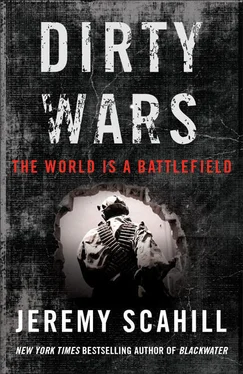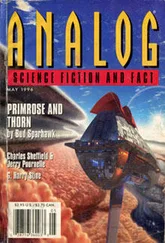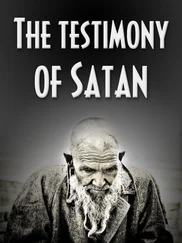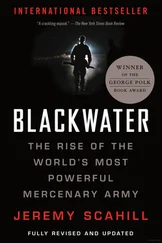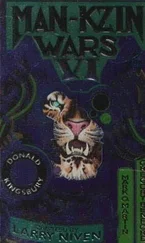Although General Petraeus would be credited years later with “winning” the Iraq War through a troop “surge,” he had also, along with Zarqawi, helped to destroy Iraq and create a sectarian bloodbath that would live on well past the US occupation. Petraeus would continue his rise to prominence and power within the US national security apparatus, but Zarqawi’s days were numbered. In June 2006 JSOC found, fixed and finished the Jordanian terrorist. On June 7, members of the task force deployed in a palm grove in Hibhib, to which US and Jordanian intel had traced Zarqawi. Some of the commandos descended on the village after scaling down ropes dangling from helicopters. Within moments, the task force had the village surrounded. According to Iraqis on the scene, the US forces came under fire from a home situated in a date grove, sparking a brief firefight. The American forces decided not to take any risks to their personnel and called in an F-16, which fired a laser-guided five-hundred-pound bomb on the house. An identical strike hit the home a short time later. Zarqawi was dead.

17. “A Lot of It Was of Questionable Legality”
SOURCE: “HUNTER”—Despite the fact that I began covering US wars in the 1990s, spending extensive time in Yugoslavia and Iraq and elsewhere in the Middle East, JSOC was not on my radar until well after the US occupation of Iraq was under way. I had no sense of the scope of JSOC’s operations or how it interacted (or didn’t) with conventional military units or the CIA. My personal gateway into JSOC was through sources I had developed while working on my investigation into the private military contractor Blackwater, which employed an abundance of former Special Ops men, including many who had worked with JSOC and the CIA. In several of the Blackwater stories I was chasing, JSOC’s name was popping up regularly. As I began investigating what was becoming an increasingly global covert war, I received an electronic communication from a man who could help make sense of this highly secretive world. When we first began communicating, I was a bit paranoid about him. My computer had just been hacked and I had received a series of threatening phone calls and e-mails pertaining to my work on Blackwater and on JSOC. So when he reached out to me, the timing seemed suspicious.
He presented himself to me as a patriotic American who believed in the Global War on Terror but said he was deeply concerned about the role that Blackwater was playing in it. He had read my book on the company, seen me on TV, and decided to get in touch. Initially, he didn’t say anything about JSOC. We just talked about Blackwater. When I would press him on his own role in various US wars, he would change the subject or be so vague in his descriptions that he could have been almost anyone in any unit. Eventually, after we communicated through encrypted electronic methods for a few months, I came to believe that he was genuinely interested in helping me understand what the JSOC world was about. After we built up trust, he told me he would talk to me about what he does on one condition: we do it in person.
I decided to call him “Hunter” because when I finally met him, it was at a dingy motel a stone’s throw from Fort Belvoir in Virginia, the home of JSOC’s intelligence wing. The motel was called “The Hunter.” It turned out to be an appropriate venue for the first of what would be many meetings over the years. Hunter had served under General McChrystal, Admiral McRaven and various Special Ops task force commanders, and he had a front-row seat for the secretive organization’s operations at the most transformative moment in its history.
There is not much I can publicly reveal about what Hunter did or does because of the tight-knit nature of the Special Ops community and because I gave him my word that I would never compromise his identity. The members of that community almost never speak to reporters, and certainly not about some of the most sensitive operations they have conducted. What I can say is that after I began meeting with Hunter, I eventually pressed him to give me evidence that he was who he said he was and had participated in or witnessed the events he gave me information about. Over the years, he would show me his various DoD badges and evidence of his clearances, as well as photos of himself in countries around the world. I vetted his documents with knowledgeable sources, while concealing his identity, and verified that he was the real deal. Beyond saying that he worked with JSOC and on several classified task forces involving operations on acknowledged and unacknowledged battlefields, there is little more that I can, in good faith, share about him.
Over the course of several years and scores of meetings and conversations, Hunter shared with me his analysis of JSOC’s rise. He was clear that he would not divulge classified information to me and would not compromise the integrity of any operations. He told me he has great reverence for General McChrystal and Admiral McRaven and described the people who make up JSOC as the best warriors available to the United States, calling them “people that have a true belief in the nation and our ideals.” He described the training required to produce SEALs, Delta Force and other operators as the most rigorous on the planet. These Special Mission Units “are given a large degree of autonomy to execute direct action, special reconnaissance counterterrorism missions on behalf of the United States Government, almost exclusively in secrecy.” Because of the nature of their work and the secrecy surrounding it, he said, “there is a potential for abuse there.”
Hunter attributed JSOC’s rise to prominence as the lead antiterrorism force after 9/11 to a belief within the Bush administration and the Special Ops community that the CIA was not up to the task of waging a global war. “There was a deep dissatisfaction with the level of human intelligence, and paramilitary operations that were being conducted on behalf of the Agency, and over time the Joint Special Operations Command, in effect, became a paramilitary arm of the administration, in that it would do the bidding of top policy makers in pursuit of political goals,” he told me in one of our early meetings. After 9/11, JSOC’s “mandate was expanded, significantly, and the funnel, if you will, was turned on. And there was billions upon billions of dollars poured into the Special Operations Command, which was then, in turn, directed to JSOC. And that coincided with a much greater latitude and freedom of movement—autonomy.”
Hunter pointed to Cheney, in particular, as the administration figure most obsessed with transforming JSOC’s role. “I was always under that impression that [Cheney] understood the ins and outs of the Department of Defense and all of its various components and agencies,” Hunter recalled. Cheney “understood that in order to radically reshape the US military and put it on a different footing for a ‘War on Terror’ or a ‘Long War’—what’s now popularly referred to as ‘countering extremism’—he would have to assert more and more authority and responsibility to darker elements of the military than before, which ultimately resulted in the Special Operations Command being given the lead when it came to prosecuting counterterrorism operations around the world.”
The Bush administration, Hunter alleged, abused the authorities for “Operational Preparation of the Battlespace,” which, as he described it, permits US military forces to “lay the groundwork for any potential or future military operations, by sending intelligence collectors, or linguists, into a theater, into a place where you have not necessarily declared war upon, to ‘prepare the battlefield.’” Under the Bush administration, he charged, “this was somehow perverted into paramilitary operations, usually of a covert nature, with no semblance of accountability. They would tell Congress one thing, and do another.” He described JSOC’s parallel rendition program, which was used to snatch and interrogate prisoners. Among the people taken, he said, were individuals whom the administration “had made a calculation not to turn over to the Department of Justice and not to have the State Department or the Ambassador at Large for War Crimes or the Central Intelligence Agency get involved. They set up their own detainee operations.”
Читать дальше
